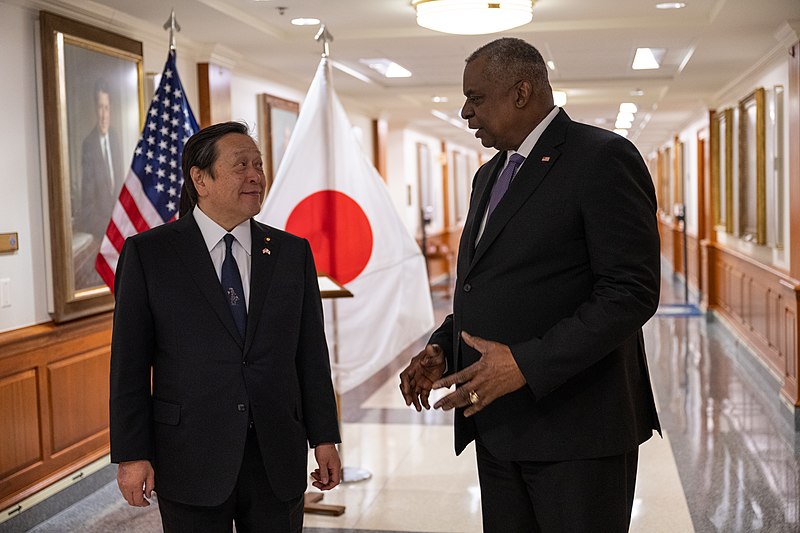Japan and South Korea are set to connect their radars through a US system to share information on North Korea’s ballistic missiles in real time. The move follows Pyongyang’s record number of missile launches in the past year as the two allies seek to bolster their defenses.
A person familiar with the matter said on Tuesday that Japan and South Korea are set to link their radars through a US system that would allow them to share information on North Korea’s ballistic missiles in real time. The defense ministers of Japan, South Korea, and the United States are also expected to come to an agreement on the sidelines of an Asian defense summit that will take place in Singapore early next month.
The spokesperson for the Japanese government Hirokazu Matsuno said no decision had been made yet on the supposed agreement. A spokesperson for the South Korean defense ministry said during a briefing that the three allies have been in talks to boost information sharing, but nothing was decided yet.
South Korea’s presidential office said Seoul would form a group with Japan and the US to share information about the isolated nation’s missiles, according to South Korea’s Yonhap. The report by Yonhap added that the system was currently in the works.
The three allies agreed in November last year to boost information sharing. Japan and South Korea are independently linked to the US radar systems but not to each other. This also comes as relations between Japan and South Korea have improved in recent months amidst the threat posed by North Korea.
Japanese Prime Minister Fumio Kishida visited South Korea over the weekend, the first visit by a Japanese leader in 12 years, following South Korean President Yoon Suk-yeol’s visit to Tokyo back in March, as both leaders sought to move past the long-running historical disputes that have strained relations between the two countries. The disputes stem from Japan’s decades-long occupation of Korea from 1910 to 1945.
Kishida told reporters following his summit with Yoon that his administration inherits the position on the matter of his predecessors, stopping short of issuing a new apology for the atrocities committed during Japan’s occupation.
Photo by U.S. Secretary of Defense/Wikimedia Commons(CC BY 2.0)



 Trump Says “Very Good Talks” Underway on Russia-Ukraine War as Peace Efforts Continue
Trump Says “Very Good Talks” Underway on Russia-Ukraine War as Peace Efforts Continue  Trump Signs Executive Order Threatening 25% Tariffs on Countries Trading With Iran
Trump Signs Executive Order Threatening 25% Tariffs on Countries Trading With Iran  Trump Signs “America First Arms Transfer Strategy” to Prioritize U.S. Weapons Sales
Trump Signs “America First Arms Transfer Strategy” to Prioritize U.S. Weapons Sales  Trump Allows Commercial Fishing in Protected New England Waters
Trump Allows Commercial Fishing in Protected New England Waters  China Warns US Arms Sales to Taiwan Could Disrupt Trump’s Planned Visit
China Warns US Arms Sales to Taiwan Could Disrupt Trump’s Planned Visit  Iran–U.S. Nuclear Talks in Oman Face Major Hurdles Amid Rising Regional Tensions
Iran–U.S. Nuclear Talks in Oman Face Major Hurdles Amid Rising Regional Tensions  TrumpRx Website Launches to Offer Discounted Prescription Drugs for Cash-Paying Americans
TrumpRx Website Launches to Offer Discounted Prescription Drugs for Cash-Paying Americans  Norway Opens Corruption Probe Into Former PM and Nobel Committee Chair Thorbjoern Jagland Over Epstein Links
Norway Opens Corruption Probe Into Former PM and Nobel Committee Chair Thorbjoern Jagland Over Epstein Links  TrumpRx.gov Highlights GLP-1 Drug Discounts but Offers Limited Savings for Most Americans
TrumpRx.gov Highlights GLP-1 Drug Discounts but Offers Limited Savings for Most Americans  South Korea Assures U.S. on Trade Deal Commitments Amid Tariff Concerns
South Korea Assures U.S. on Trade Deal Commitments Amid Tariff Concerns  U.S. Announces Additional $6 Million in Humanitarian Aid to Cuba Amid Oil Sanctions and Fuel Shortages
U.S. Announces Additional $6 Million in Humanitarian Aid to Cuba Amid Oil Sanctions and Fuel Shortages  Pentagon Ends Military Education Programs With Harvard University
Pentagon Ends Military Education Programs With Harvard University  U.S. Lawmakers to Review Unredacted Jeffrey Epstein DOJ Files Starting Monday
U.S. Lawmakers to Review Unredacted Jeffrey Epstein DOJ Files Starting Monday  U.S. to Begin Paying UN Dues as Financial Crisis Spurs Push for Reforms
U.S. to Begin Paying UN Dues as Financial Crisis Spurs Push for Reforms  Trump Lifts 25% Tariff on Indian Goods in Strategic U.S.–India Trade and Energy Deal
Trump Lifts 25% Tariff on Indian Goods in Strategic U.S.–India Trade and Energy Deal  Missouri Judge Dismisses Lawsuit Challenging Starbucks’ Diversity and Inclusion Policies
Missouri Judge Dismisses Lawsuit Challenging Starbucks’ Diversity and Inclusion Policies  Nighttime Shelling Causes Serious Damage in Russia’s Belgorod Region Near Ukraine Border
Nighttime Shelling Causes Serious Damage in Russia’s Belgorod Region Near Ukraine Border 































